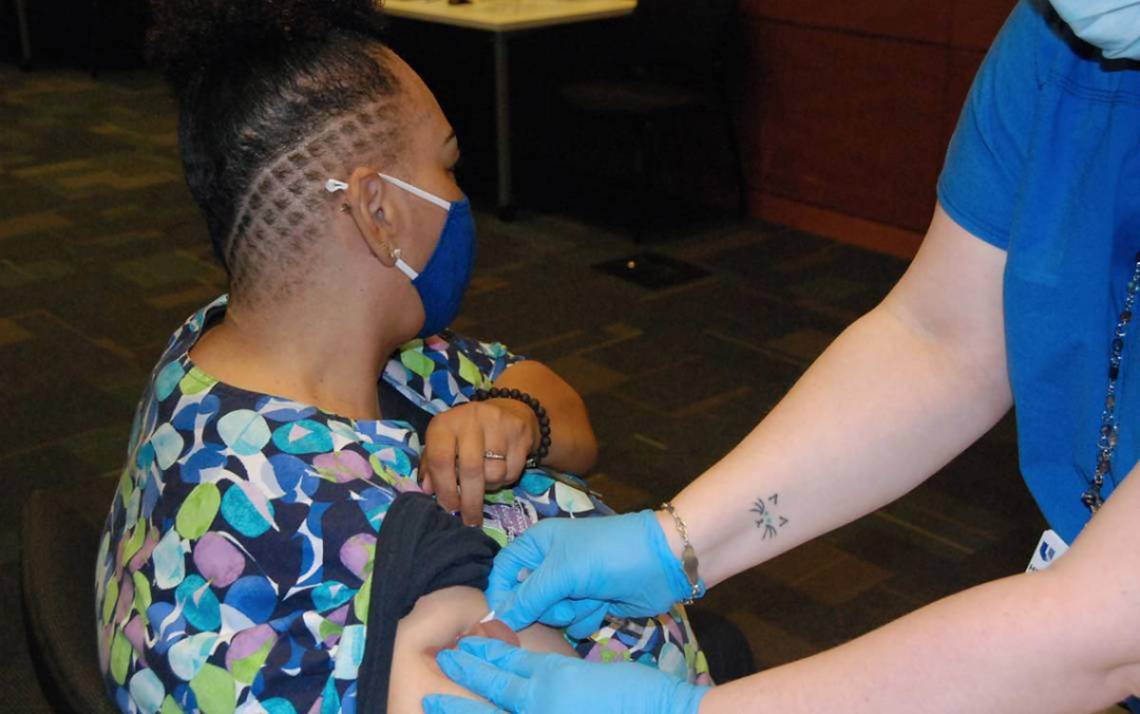Personalized Engagement Drives Duke’s Vaccination Progress
About 82 percent of university staff and faculty are fully vaccinated against COVID-19

Duke has been pulling out all the stops to get as many employees vaccinated before the beginning of the fall semester in August.
About 82 percent of University staff and faculty are fully vaccinated against COVID-19, compared to 56 percent of adults in North Carolina. The gains have come through a coordinated effort to directly engage employees and make it easy and convenient for community members to get vaccinated while at work.
To help, Duke has arranged for vans to shuttle staff members in Transportation and other units such as Facilities, Housekeeping and Dining to vaccination clinics on campus during their paid shift.
As a result, 81 percent of Duke’s bus drivers are now vaccinated.
Staff in Duke’s Employee Occupational Health and Wellness (EOHW) also called more than a thousand employees who had not been vaccinated to answer questions and schedule appointments.
“We wanted to provide employees the opportunity to address any concerns or questions they may have,” said Dr. Carol Epling, director of EOHW. “There is a lot of misinformation out there, and people often don’t know what information to trust. We try to provide reassurance and share facts. We are worried about anyone who is unvaccinated because they are much more likely to have severe complications that require hospitalization.”
Helen Barnes has worked in Duke Dining for 21 years and was hesitant to get the COVID-19 vaccine. But seeing the long-term effects of the disease on family members left an impression on her.
“One of my sisters-in-law is still having problems months after getting COVID,” she said. “She had seizures and was hospitalized for a while. She still can’t drive because of those problems.”
Barnes received her vaccination this week at a walk-in clinic near her worksite, which made it more convenient for her. “I have grandkids, and soon I’ll be around 1,800 students on East Campus, so I want to make sure they are all safe,” she said.
Epling said that the majority of cases being seen among patients at Duke University Health System are a result of the Delta variant, which is much more transmissible than other strains of the virus. Cases among students and employees have started to increase after several weeks with few or no cases reported on campus. Most of those individuals were not vaccinated.
“With the prevalence of the Delta variant in our community, we are turning over every stone to get as many people vaccinated as possible,” said Kyle Cavanaugh, vice president for Administration, who leads Duke’s Coronavirus Response Committee. “We want to prevent people from getting sick with a potentially deadly virus because they are not vaccinated.”
Vaccination or an approved medical or religious exemption is required for all Duke students, faculty and staff. Anyone who received the COVID-19 vaccine outside of the Duke employee vaccination clinic (e.g. pharmacy, health department, other institution) can submit a completed vaccination card through Duke VaxTrax.
Send story ideas, shout-outs and photographs through our story idea form or write working@duke.edu.